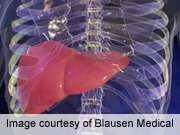Sofosbuvir seems to be a promising treatment option for patients with chronic hepatitis C virus infection, according to two studies published online April 23 in the New England Journal of Medicine to coincide with presentation at The International Liver Congress, the annual meeting of the European Association for the Study of the Liver, held from April 24 to 28 in Amsterdam.
(HealthDay)—Sofosbuvir seems to be a promising treatment option for patients with chronic hepatitis C virus (HCV) infection, according to two studies published online April 23 in the New England Journal of Medicine to coincide with presentation at The International Liver Congress, the annual meeting of the European Association for the Study of the Liver, held from April 24 to 28 in Amsterdam.
Ira M. Jacobson, M.D., from Weill Cornell Medical College in New York, and colleagues conducted two randomized phase 3 studies involving patients with chronic HCV genotype 2 or 3. The researchers found that the rate of sustained virologic response was 78 percent with sofosbuvir and ribavirin versus 0 percent with placebo in patients for whom peginterferon treatment was not an option. For previously treated non-responders, the rate of response with sofosbuvir and ribavirin was 50 percent at 12 weeks and 73 percent at 16 weeks.
Eric Lawitz, M.D., from the Texas Liver Institute in San Antonio, and colleagues conducted two phase 3 studies in previously untreated patients with HCV. The researchers found that in a single-group study the sustained virologic response was 90 percent with a 12-week regimen of sofosbuvir plus peginterferon alfa-2a and ribavirin. In the non-inferiority trial, the sustained virologic response was 67 percent for patients treated with 12 weeks of sofosbuvir plus ribavirin and 67 percent for those treated with 24 weeks of peginterferon alfa-2a plus ribavirin.
"The data from the sofosbuvir trials suggest that a radical change in clinical practice is imminent," write the authors of an accompanying editorial.
Several authors from the Jacobson study disclosed financial ties to pharmaceutical companies, including Gilead Sciences, which manufactures sofosbuvir and funded both studies.
More information:
Full Text - Jacobson
Full Text - Lawitz
Editorial
More Information
Journal information: New England Journal of Medicine
Health News Copyright © 2013 HealthDay. All rights reserved.



















